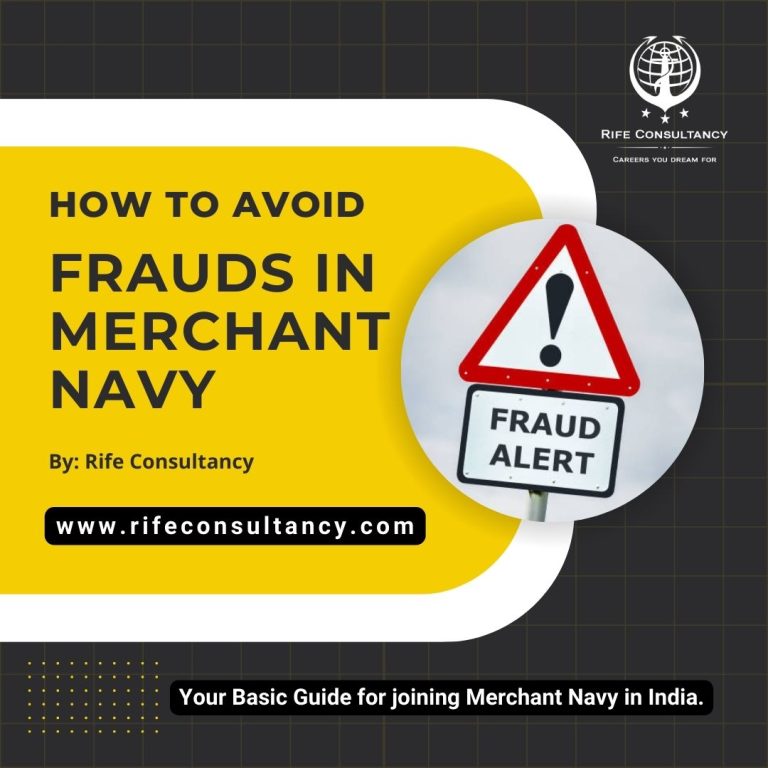
Safeguarding Your Journey: How to Avoid Frauds in Merchant Navy
By: Amaiya Rathi (Content Writer)
Welcome to our comprehensive guide on how to Avoid frauds in Merchant Navy. Aspiring seafarers face not only the excitement of a rewarding career but also the challenge of navigating potential frauds and scams prevalent in the industry. In this blog, we will explore essential tips and strategies to help you avoid fraudulent schemes, protect your career, and ensure a successful journey in the maritime world.
A decade ago, the maritime industry was a booming sector. There was a scarcity of marine officers at that time. The merchant navy was a niche industry with little public awareness. As a result, there was a big need for qualified sailors everywhere, but the supply was actually quite low. To address this issue, some shipping companies built their own training facilities across the nation and began enrolling hundreds of cadets each year.
Many unauthorized maritime colleges opened their doors to ambitious seafarers during this time, but they were unable to offer job placement upon course completion. Each year, thousands of aspiring sailors graduate from their courses without employment. As a result, the Indian maritime industry saw an increase in scams and fraud agents.
Table of Contents
These con artists preyed upon students who were going through the worst moment of their lives since they were unable to secure employment despite having paid thousands of rupees to their respective maritime colleges. The merchant navy is currently one of the most in-demand industries in the nation. Unfortunately, career possibilities in this field are no longer as plentiful as they were a decade ago.
This is one of the factors contributing to the continued success of these fraudsters and universities in our nation. Each year, thousands of aspiring sailors struggle to secure employment upon course completion. These applicants are prepared to pay any sum of money to be allowed to board ships. However, they dig themselves a deeper hole by becoming engaged with brokers. We’ll outline some strategies in this blog post so you can avoid falling victim to these merchant navy scams.

Tips to Avoid frauds in Merchant Navy
1. Select the Correct Course
If you want to join the merchant navy, you should be knowledgeable about the stream or course you want to take. Sometimes individuals who are not very knowledgeable about the maritime industry choose the incorrect course and later regret it after realizing they were qualified for much better courses. Candidates from rural areas in particular are duped into enrolling in GP Rating colleges. They are assured that they will hold the position of officer or captain in 4 to 5 years.
However, they soon realize that the reality is quite different and that becoming an officer through GP Rating is extremely demanding and difficult. Some of these candidates may even be qualified for the Diploma in Nautical Science, but they choose the incorrect subject because they lack knowledge and research.
You can fill in your details and check the courses you are qualified for using this eligibility checker.
2. Research Well About Colleges
Before deciding to enroll in any marine institution or institute, be certain to do thorough research. Choosing the right college or organization to work for is crucial to having a successful maritime career. There is no turning back once you are chosen by an above-average shipping firm or college, and your transition from college to working on ships will be quite easy and hassle-free.
Therefore, thoroughly investigate the placement history of the maritime college you intend to attend. Interacting with the students who are currently enrolled in that particular college will give you the greatest insight. Always keep in mind that maritime institutes and courses must be approved by DG Shipping and the Indian Maritime University (IMU).
3. Follow the Proper Procedure
Don’t try to enter the Merchant Navy by taking shortcuts. To pursue the appropriate course, follow the correct approach. If you wish to choose a diploma in nautical science, a BSc in nautical science, a B.tech in marine engineering, etc., take the IMU-CET exam and attempt to acquire the best score you can.
Improve your technical knowledge and communication abilities while attempting to secure sponsorship from a reputable shipping company. Always keep in mind that universities with minimal conditions for qualifying typically do not care about the placement of their students. Therefore, aim to get into the nation’s top maritime universities, which are highly selective in their admissions process.
4. Do Not Trust Random Websites
Any search engine will have adverts for random maritime colleges across the nation offering 100% placement if you type in “how to join merchant navy.” They’ll utilize phrases like “Join today to earn 100,000 Rs per month onboard ship,” which are quite alluring. Even leaflets and brochures with these adverts may be found in stationery stores.
Never forget that reputable colleges and institutions never promote themselves. Consider your options before succumbing to the dubious claims made on arbitrary websites, which are typically operated by fraudsters in the merchant navy.
5. Secure a Sponsorship Before Joining a Course
Sponsorship in the Merchant Navy means that you have been promised by a company that upon completion of your pre-sea course you will be trained on-board their ship and provided placement where you are also entitled to receive a stipend during your training period.
For example, In India, if you are undergoing 1 Year D.N.S (Diploma in Nautical Science), then it is mandatory to complete 18 months of training onboard ship to be eligible for some courses and to appear for 2nd Mate C.O.C examinations conducted by M.M.D, D.G Shipping, Govt. of India. So, for that 18 months of training, you need to find a company and for the D.N.S course, it has to be done before the course starts.
The process of getting sponsored generally includes the following steps:
- Apply for Sponsorship with a good company and appear for their Assessment, Interview, and medical tests which you have to pass.
- Apply for IMU-CET and obtain cutoff marks. IMU-CET needs to be given when you are applying for DNS, B.Sc in Nautical Science, and B.Tech in Marine Engineering.
- After obtaining the sponsorship, you can complete your pre-sea training at a college affiliated with your company.
To learn in-depth about sponsorship in the merchant navy, check out this blog. It is the safest and best method to secure a job without falling prey to fraud.
How Rife Consultancy Can Help?
No, we are not an agent claiming to get you a job by taking a huge sum of money. If you really want to join the industry the right way and make a career in it, we can help by giving you proper guidance. We can help you prepare for sponsorship exams, medicals, interviews, and get into the right course. We are affiliated with DG Shipping-approved colleges and can guide you in getting admission in one of the top colleges in India.
Contact us today and we’ll be glad to help!
Click here to join our Telegram chanel
You will get information, news, and support related to Merchant Navy.
